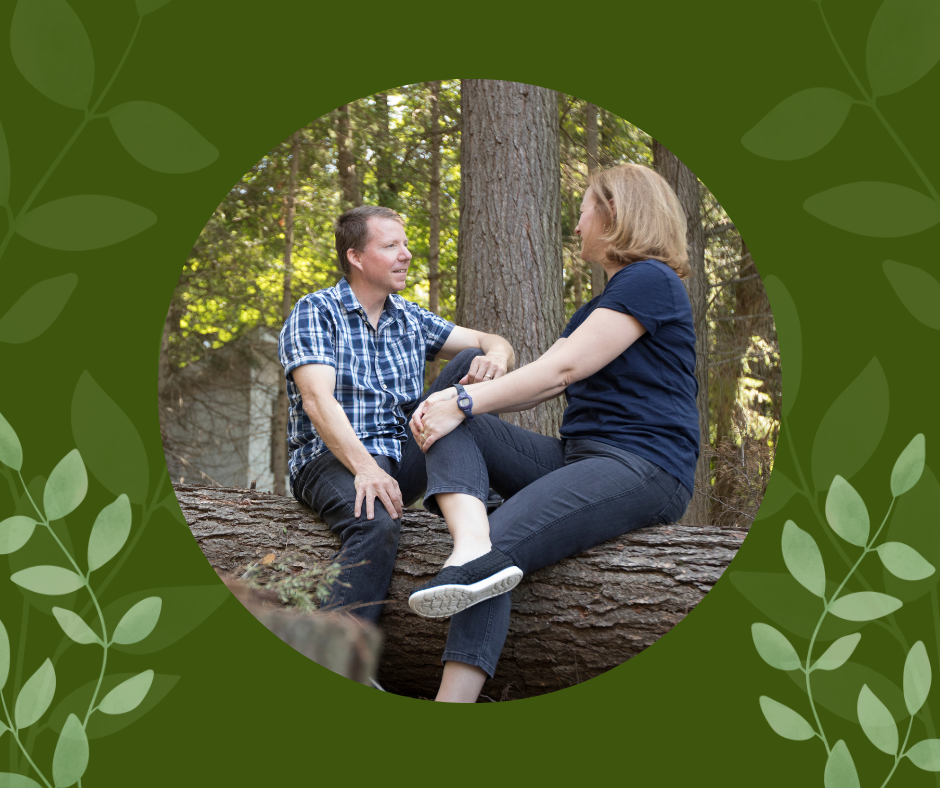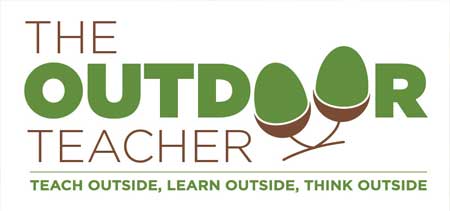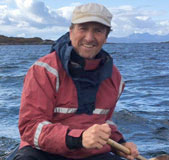Certificate in Nature-based Practice
Gain the skills and confidence you
need to take your practice outdoors
This course is led by experienced health and education nature practitioners
This Autumn we are offering FREE, FULLY FUNDED Training Places for NHS Staff who work with young people with severe mental health challenges or complex needs in order to learn to implement nature-based practices into their services.
Why take this course
“Stepping out into nature from our traditional indoor setting, frees my clients from the constraints of eye contact which helps them to relax and facilitates trust and conversations.”
Nature connection is a powerful therapeutic tool for supporting people living with a wide range of mental and physical health conditions. If you are thinking about taking people, young and old, outdoors, either on a one to one basis or in groups, then this course is the best place to start.
This training brings together best practice and theory from nature connection, eco-psychology, embodiment, resilience, mental health and neuroscience to enable working with individuals and groups of all ages.
How and what you will learn
Through a combination of experiential learning, webinars and online resources, you’ll gain the confidence and competence to work with people in a range of outdoor settings.
- A therapeutic nature-based model that meets your clients’ whole health: mind, body, social and environmental relationships
- Nature connection, neuroscience and supporting mental health
- Practical outdoor nature-based skills and activities
- Adapting activities to a range of green spaces
- How to be a reflective practitioner
- Practical skills to minimise risks associated with taking groups in your care outdoors
- Ways of embodying your own nature based relationships in order to stimulate and balance clients brain body relationships
Next available course dates
First Aid
All practitioners working remotely outside with clients, must hold the 16 hour Outdoor First Aid Certificate which is valid for 3 years. Silver Fox Training Ltd delivers our Outdoor First Aid Training on our behalf. All the details can be found here.
Research Information
This training has been funded by Natural England as part of a research project to look at how NHS staff can be trained in nature-based interventions in ways that best embeds nature practice within the NHS service. You will be asked to participate in individual and or group interviews to evaluate key enablers and barriers to implementation!
Who is Nature-based Practice Training for?
Priority will be given to NHS staff who work with young people with severe mental ill-health and complex needs.
The course is suited to professionals who support children, young people and adults, including:
- Psychiatrists
- Psychotherapists or psychologists
- Health professionals
- Mental health workers
- Occupational therapists
- Art, drama or play therapists
“Nature is our great untapped resource for our a mentally healthy future.”
Has Covid prompted you to consider taking your work into the outdoors?
The pandemic has led many to accept Green social prescribing, interventions and greencare programmes as a pathway to health and wellbeing.
CLR and our trainers deliver the breadth of experience across educational and therapeutic nature-based programmes.
We aim to be as inclusive as possible. The tools and techniques will equip you with the confidence and competence to add nature-practice to work.
Further information
By the end of this nature-based practice training programme, you’ll be able to:
Learning Objectives 1: Place | Locate a suitable place
|
|
Learning Objective 2: People | Your clients
- Understand the equipment required to undertake activity in a woodland/greenspace site
- Understand how to engage staff, groups, parents, teams, volunteer helpers and the wider community
- Be able to develop routines for going outdoors through safety, inspiring games and activities
- Understand how the partnership model supports the values and approach that underpins this model: co-production and participation
- Recognise how ‘the relationship heals’: to self, other, nature
- Be able to employ effective communication, therapeutic skills and strategies
Learning Objective 3: Practice & practical | How to set up and facilitate nature-based programmes
|
|
Learning outcome 4: The Practitioner
This module explores:
|
|
Testimonials
The range of activities was excellent. There was a good balance of theory to practical, and plenty of opportunity to discuss our role as psychiatrists in nature based practice. The individual activities themselves were very enjoyable, and there is nothing like such first hand experience to demonstrate how important this kind of work is for mental wellbeing.
Excellent facilitation, well held, great experiential and skills learning sessions. It was very heartening to be among a group of such inspiring professionals! A great opportunity to really experience and engage with the kinds of nature-based woodland activities that clients might be referred to, in a connected and embodied way. Really enjoyed learning new skills!
The trainers made a really fun and engaging introduction to the concepts of nature based work for mental health. It felt like a truly authentic and heartfelt delivery of ideas that the instructors were so passionate about.
You created a beautifully nourishing, creative, open, non judgemental atmosphere, that felt completely different and more impactful than other learning environments. You helped everyone connect with their bodies and the woods and each other in a very restorative way. You shared deep experience and skills and the wisdom you shared about people, land and mental health offered a fresh and different perspective. Thank you
This course was an amazing demonstration of how to run nature-based workshops, with fantastic sensory and body-based exercises, engendered great sense of nature-connectedness, plenty of opportunity to bond with group members, amazing framework of culture/history/poetry/neuroscience all intertwined.
How the Certificate in Nature-based Practice works
Practical outdoor nature-based work
We’ll explore experiential activities outside in nature, including core practical outdoor skills and nature/social connection activities, emergency planning, risk-benefit assessment & health & safety, core routines and outdoor activities. Also, an introduction to environmental management and leave no trace principles. And model therapeutic sessions.
The role of nature in mental health
We will explore how nature aids recovery. In particular, the links between the rise of mental health problems and our separation from nature in Western culture. Also, the benefits of sensory experiences for our wellbeing, including sensory processing dysfunctions and sensory integration as per Ayres (1989), supported by neuroscience of body-based, bottom-up, and top-down strategies for regulating our emotions. We will introduce nature-centric models, where we link our development to broader natural cycles.
Therapeutic skills and effective communication
We’ll explore theoretical and therapeutic research efficacy and value of nature-based work, such as green intervention and nature activities. We will underpin our practice with theory, including the person-centred approach, habitat theory, biophilia, emotional literacy, mind, brain, body relationships with trauma and the polyvagal theory.
Personal development & reflection
We’ll champion the need to be a reflective practitioner and lifelong learner. We will explore the limits of our constructs and invite participants to have their own experience of nature, connection and relationship with the more-than-human world.
Course details
Watch our webinar about this course
| Number of units | 4 |
| How long will it take? |
|
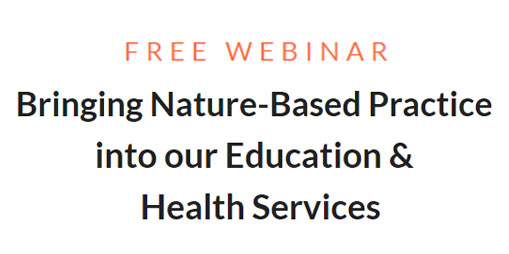
Course Features
- Four days direct training: (2 parts: 3 days; 1 day (post-delivery)
- Plan and deliver three sessions in a green space
- Comprehensive nature-based practitioner manual
- 5 webinars
Access to The Outdoor Teacher’s Forest School Activities Online Training Course taught by Circle of Life Rediscovery founder, author, and trainer Marina Robb. This includes:
- 100 videos and resources and step by step instructions
- A bumper pack of additional inspiring activities and ideas to use in your forest school sessions
- Core nature and forest skills underpinned by safe and person-led practice
The Webinars
Marina Robb & Jon Cree: Health & safety in the outdoors
Roger Duncan: Bringing nature into mental health practice and services
Marina Robb & Jon Cree: Nature-centric models & human development
Alison Roy: "Inside out” : Psychotherapeutic interventions in outside spaces
The natural landscape can provide healing and a different kind of secure base for discovering more about ourselves, our histories, or journeys. Painful feelings are bound to arise for those whose lives have been affected by trauma and it can be hard to know how to transform these feelings and experiences into something meaningful.
Through building therapeutic alliances supported by the natural landscape, it can be possible to build a strong and safe home inside and out. This way of working has a richness and a depth to it which is both enlivening and creative – as well as its risks and challenges which I will explore in this webinar.
Over the last year, so much of what had been familiar has suddenly felt changed, alien and out of reach for people with little time to adjust. We have each had to negotiate massive changes in our environments and our relationships an experience which has sorely challenged our sense of safety and stability but also our perception of “home”. Spending time learning about ourselves in the natural world can provide us with a better understanding of those we work with, but it can also provide us with an opportunity to re-connect with stories about loss and change, but also resilience and growth.
Jon Cree: The senses and nature play
Your Nature-based Practice training team
Course Director & Lead Facilitator: Marina Robb (MS, MSc, PGCE, Author)
Marina is a national expert in nature-based educational and therapeutic interventions. Marina also has extensive experience in the development of the Forest School movement, and is an endorsed trainer for the Forest School Association.
Elsewhere, Marina co-authored the popular, ‘Learning with Nature: A how-to guide to inspiring children through outdoor games and activities’ and ‘The Essential Guide to Forest School and Nature Pedagogy’ (with Jon Cree)
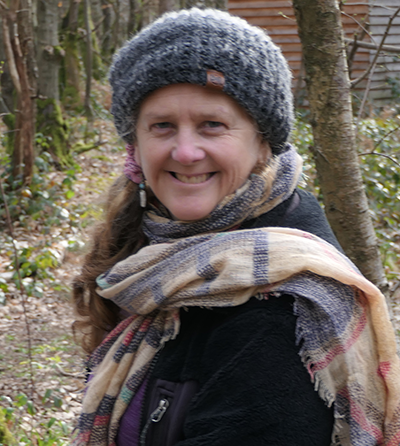
Jon Cree
Lead Facilitator
Roger Duncan
Webinar Speaker
Alison Roy
Webinar Speaker
Our Track Record
Since 2009 CLR has offered green care programmes to a wide range of service users.
We have pioneered green interventions working in partnership with NHS departments – CAMHS, FISS CAMHS, Early Psychosis, Dementia, LACAMHS and more.
Find out more about our green interventions work.
Since 2004, we’ve raised over £500,000 to support groups to access nature freely.
As a team we have worked within education since 1980.
Why get certified?
The contemporary industrial model for social and economic development has a fatal impact on our ecosystems and a detrimental effect on human mental health and psychological wellbeing.
Indeed Covid has highlighted the need for more nature-based nature-based approaches to mental health interventions.
Nature-based training is a preventative and early intervention model that supports practitioners to work outdoors in partnership with clients and groups.
When developing the model, we weaved together findings from neuroscience, forwarded a systemic understanding in a trauma-sensitive way, and built trust and safety to thrive in relationship with other humans and the non-human world.
At the same time, we minimised any risks of nature-based practice while leveraging its potential benefits.
Why learn with Circle of Life Rediscovery?
Circle of Life Rediscovery CIC is committed to transforming education, health and family and supporting people to reach their potential through nature.
We have over 25 years of experience in training professionals and inspiring thousands of people of all ages and backgrounds into the outdoors in both the UK, Ireland, Portugal and SE Asia.
We are a leading organisation in nature connection and personal development. As such, we’ve received many grants and awards for our work with groups across different ages and backgrounds.

